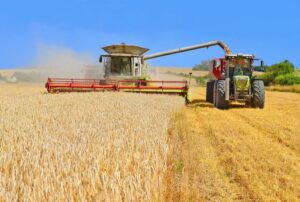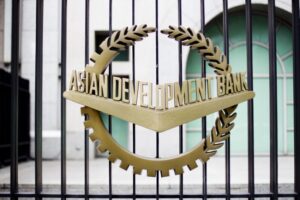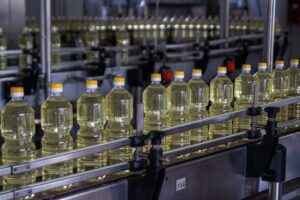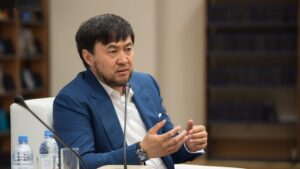2022-2024 goods trade balance forecast (USD bln)

Source: Open4Business.com.ua

The U.S. Department of Agriculture (USDA) in its August report raised its wheat harvest forecast for Ukraine in the 2024/2025 marketing year (MY, July 2024/June 2025) by 10.8% to 21.6 million tons, and exports by 7.7% to 14 million tons
Analysts also revised upward the domestic consumption of wheat in Ukraine by 10.5% to 7.4 million tons. Ukraine will enter the season with starting residues of 770,000 tons, while a month earlier they amounted to 1.08 million tons. USDA expects that by the end of 2024/2025 MY the country will have 1.05 mln tons of wheat, which is 9.4% higher than the July forecast.
At the same time, USDA forecasts world wheat production for the 2024/2025 season at 798.28 (+ 2.18 million tons from last forecast) and world exports at 214.86 million tons (+ 1.98 million tons). The experts lowered the forecast of wheat ending stocks in the world to 256.62 million tons (- 1.97 million tons).

The Asian Development Bank has approved two loans to Uzbekistan totaling $400 million to implement large-scale reforms in the energy sector aimed at improving its efficiency and competitiveness, as well as developing the country’s financial markets.
ADB’s Director General for Central and West Asia, Evgeny Zhukov, said that the reforms supported by these programs will help create an enabling environment for regulators and companies to play their part in stimulating development by creating reliable domestic financial markets and meeting energy needs while fighting climate change.
ADB will provide $300 million to reform Uzbekistan’s energy sector, including creating a more effective governance structure, improving legislation, and attracting private investment.
To develop Uzbekistan’s financial market, ADB will provide $100 million to implement regulatory and institutional reforms aimed at improving market conditions to optimize financial transactions and services, and to increase supply and demand side measures to grow capital markets.
Uzbekistan joined ADB in 1995, and since then, the bank has provided $12.5 billion in loans, grants, and technical assistance to the country.

Rapeseed oil exports in July-June 2023-2024 marketing year (MY) reached a record high of more than 420,000 tons, Ukroliaprom association said.
“Ukrainian rapeseed oil is confidently entering the markets of China, EU, Malaysia, Singapore and other countries of the world. Positive dynamics is also observed for rapeseed meal,” the industry association said.
According to Ukroliaprom, for the first time in all years in Ukraine processed 1.0 million tons of rapeseed, which amounted to 22.3% of the harvest in 2023, and this despite the fact that rapeseed is considered mainly export-oriented raw materials.
In addition, exports of soybean oil and meal, and their production and processing accordingly, continue to grow, especially in January-June 2024.
“The growth of domestic processing of seeds and soybeans, as well as a significant increase in exports of high value-added products, namely oil and meal, confirms the association’s position on the need to create conditions for maximum processing of oilseeds at domestic facilities. Further development of the oil and fat industry of Ukraine is expected not so much in increasing the processing of sunflower seeds, but in such oilseeds as soybean and rapeseed, which are still considered as export-oriented. In this matter we hope for the support of the Ministry of Agrarian Policy and Ministry of Economy of Ukraine”, – emphasized the industry association.
Ukroliaprom stated that sunflower oil exports in January-June 2024 doubled compared to the same period in 2022 and 1.3 times in 2023. In the ten months of 2023-2024 MY, sunflower oil exports increased 1.2 times compared to the same period of 2022-2023 MY.

In January-July this year, Ukrainian enterprises increased their consumption of rolled metal products by 1.67% year-on-year to 2 million 34.6 thousand tons.
According to a press release issued by Ukrmetallurgprom on Monday, 711.6 thousand tons, or 34.97% of the domestic rolled metal consumption market, were imported during this period.
According to Ukrmetallurgprom, in January-July 2024, steel companies produced 3.728 million tons of rolled metal products (128.4% compared to the same period in 2023), of which, according to the State Customs Service of Ukraine, about 2.405 million tons, or 64.5%, were exported. In January-July 2023, the share of exports amounted to 51.3% (1.490 million tons against a total production of 2.903 million tons of rolled steel).
The share of semi-finished products in export deliveries in January-July 2024 amounted to 46.90%, which is the same as in January-July 2023 (46.11%). The share of flat products in export deliveries in seven months of 2014 is significantly higher than in January-July 2023 (39.83% and 34.77%, respectively). The share of long products is significantly lower than in January-July 2023 (13.26% in 2024 vs. 19.13% in 2023).
“In 7 months of 2024, the domestic market capacity amounted to 2034.6 thousand tons of rolled steel, of which 711.6 thousand tons or 34.97% were imported. In January-July 2023, the domestic market capacity was 2001.2 thousand tons, of which 588.2 thousand tons or 29.39% were imported. Thus, for 7 months of 2024, there is an increase in the domestic market capacity by 1.67% compared to 7 months of 2023, with a simultaneous increase in the share of the import component by 5.58%,” the press release states.
The structure of imports in January-July 2024 is still characterized by a significant dominance of flat products over long products (79.38% and 19.04%, respectively); in January-July 2023, the dominance of flat products over long products was also significant (78.83% and 20.13%, respectively).
According to the State Customs Service, the main export markets for Ukrainian rolled steel products in January-July 2024 were the European Union (74.3%), Africa (8.8%) and the rest of Europe (7.6%). Among metallurgical importers in the first seven months of 2024, the first place was taken by other European countries (47.1%), the second by the EU-27 (29.8%), and the third by Asian countries (21.2%).
As reported, Ukraine’s rolled metal market grew 2.19 times in 2023 compared to 2022, to 3 million 505.6 thousand tons.
The company imported 1 million 118.6 thousand tons, or 31.91% of the domestic rolled metal consumption market.

Kairat Satybaldy (Satybaldyuly), nephew of former Kazakh President Nursultan Nazarbayev, has returned illegally acquired assets worth $1.6 billion to the state since 2022, the press service of the Anti-Corruption Agency reported.
“Since 2022 until now, property assets and cash worth over 732.8 billion tenge or $1.6 billion illegally acquired by K. Satybaldyuly and persons related to him have been returned to the state,” the report said.
Of these, $661.5 million were found abroad and were returned to Kazakhstan as soon as possible, including from such countries as Austria, Liechtenstein, UAE and Turkey.
According to the press service, 28.8% of shares of Kazakhtelecom JSC for 93.8 billion KZT (almost $196 million); CTS JSC (Transport Service Center) for 30.2 billion KZT ($63.1 million); shares in 4 companies for 10.3 billion KZT ($21.5 million); property assets in Kazakhstan for 158.5 billion KZT ($331.1 million) were returned to the state; exclusive jewelry worth 105.39 bln KZT ($230 mln); money on Kazakhstani accounts – 36.8 bln KZT ($76.9 mln); money from Austria – 36.8 bln KZT ($82.1 mln); money from Liechtenstein – 116.7 billion tenge ($260.5 million); money from UAE – 6.3 billion tenge ($14 million); money from Turkey – 2.2 billion tenge ($4.92 million); sale of securities – 135.8 billion tenge ($300 million).
In the state property transferred 115 Kazakh objects worth more than 158 billion tenge ($330 million), including 73 real estate (13 houses, 10 buildings, 13 land plots, 4 apartments, 3 structures, 2 madrasah buildings with an annex, 2 parking lots, 25 premises, 1 construction in progress), 37 items of movable property (29 cars, 5 special equipment, 3 quad bikes) and other property.
It is noted that some of the property was registered to his close relatives, affiliated persons and controlled companies. The total area of administrative buildings transferred to the state in the cities of Astana and Almaty exceeds 180 thousand square meters. m.
“Previously, these assets were leased and annually brought the owner a multi-billion dollar income, the recipient of which is now the state”, – said in Anticor.
For example, one of the luxury objects – the former residence of Satybaldyuly in the village of Barap, Akmola region, with a total area of 1.5 thousand square meters with a land plot of 135 hectares – was transferred to the Department of Education of Astana.
The agency added that during the investigation Satybaldyuly fully admitted his guilt, reimbursed the damage in full, as well as contributed to the investigation of criminal offenses and disclosure of property obtained by criminal means.
The Anticorruption Service investigated criminal cases against Satybaldyuly on the facts of embezzlement of funds of Kazakhtelecom JSC, Transport Service Center JSC on a large scale, legalization (laundering) of money and other property obtained by criminal means, as well as evasion of customs duties by the company controlled by him.
The official rate for August 12 – 477.04 tenge/$1.